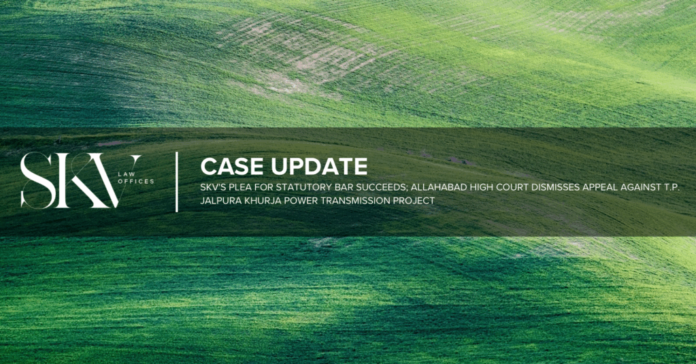SKV’s Plea for Statutory Bar Succeeds; Allahabad High Court Dismisses Appeal Against T.P. Jalpura Khurja Power Transmission Project
06.08.2025
The Allahabad High Court has dismissed a second civil appeal filed by a landowner, i.e., (Appellant), seeking to restrain T.P. Jalpura Khurja Power Transmission Limited (Respondent) from laying transmission lines over his agricultural land. The judgment, delivered on 28.07.2025 by Hon’ble Justice Shekhar Kumar Yadav in Second Appeal No. 671 of 2025, affirms the rejection of the civil suit at the threshold stage and reiterates the statutory bar on civil court jurisdiction in matters governed by the special legislation, such as the Indian Telegraph Act, 1885, and the Specific Relief Act, 1963.
The Indian Telegraph Act, 1885 authorises the Central Government and licensed entities to install telegraph infrastructure on private property for public purposes. It provides a dispute resolution mechanism through the District Magistrate under Section 16, thereby excluding civil court jurisdiction where such special remedies exist. Similarly, the Specific Relief Act, 1963 restricts courts from granting injunctions that would delay notified infrastructure projects (Section 20A) or where alternate remedies are available under special laws.
The dispute arose from a suit filed by the Appellant, Mahesh Chand Sharma, who sought a permanent injunction to prevent the Respondent power transmission company from laying overhead lines across his farmland situated in Village Dhanora, Bulandshahr district. The suit, instituted in 2024, claimed interference with possession and sought to restrain the company from entering or using the land for transmission infrastructure.
While the trial court granted injunction at the first instance, it was argued by the power transmission company that the suit is barred in law in terms of Order VII Rule 11(d) of CPC due to the operation of the Telegraph Act and the Specific Relief Act. The Respondent asserted that it had been granted transmission license under Section 164 of the Electricity Act, 2003, which extended to it the powers of the Telegraph Authority, and therefore any objections to the laying of lines were to be addressed under Sections 16 and 17 of the Telegraph Act before the District Magistrate, not the civil court. The trial court, upon considering the legal framework, allowed the Respondent’s application and rejected the plaint, holding that it sought relief expressly barred by law. This order was upheld by the District Judge, Bulandshahr, in Civil Appeal No. 188 of 2025. The landowner then approached the High Court in second appeal under Section 100 of the CPC.
At the admission stage, the High Court examined whether any substantial question of law arose that would warrant interference with the concurrent findings of the two lower courts. The Appellant argued that civil court jurisdiction was not completely ousted under Section 10 of the Telegraph Act, and that questions of fact and law could only be adjudicated after a full trial. Citing judgments such as M.P. Electricity Board v. Vijaya Timber Co. and Power Grid Corporation v. Ram Naresh Singh, the Appellant maintained that the plaint disclosed a valid cause of action.
On the other hand, the Respondent submitted that the suit was frivolous and filed in suppression of material facts. It was emphasised that the project was a duly approved infrastructure undertaking under the Electricity Act, and that Sections 20A and 41(ha) of the Specific Relief Act expressly barred civil courts from issuing injunctions that obstruct infrastructure projects.
The High Court agreed with the Respondent’s position, holding that both lower courts had rightly concluded that the suit was barred in law. The Court reiterated that once the statutory remedy under the Telegraph Act was available and the transmission licensee was empowered with Telegraph Authority powers, civil courts could not entertain injunction suits against such Infrastructure projects. Soliciting the above position, the Court relied on the Supreme Court’s ruling in Dhruv Green Field Ltd. v. Hukam Singh to support the principle that a special statute with a complete mechanism implies a bar on civil court intervention. The Court further observed that the relief sought was plainly prohibited by law and that no amount of “clever drafting” could override express statutory bars and issue perpetual injunction. The plaint on its face sought relief contrary to law and was thus rightly rejected under Order VII Rule 11(d) CPC. It was also clarified that the Appellant’s reliance on the decision in Ganga Sagar Yadav v. Smt. Dulari was misplaced, as that judgment dealt with a different statutory context (Section 145 of the Electricity Act) and not the specific bar created by the 2018 amendments to the Specific Relief Act.
Concluding that no substantial question of law arose from the Second Appeal, the Court dismissed it at the admission stage with no order as to costs.
Click here to read the judgement.
T.P. Jalpura Khurja Power Transmission Limited was represented before the Allahabad High Court by Shryeshth Ramesh Sharma (Senior Partner), Abhishek Nangia (Senior Associate), Vineet Kumar (Senior Associate) and Mohit Gupta (Associate) of the SKV Law Offices Team.
[ad_1]
Source link

